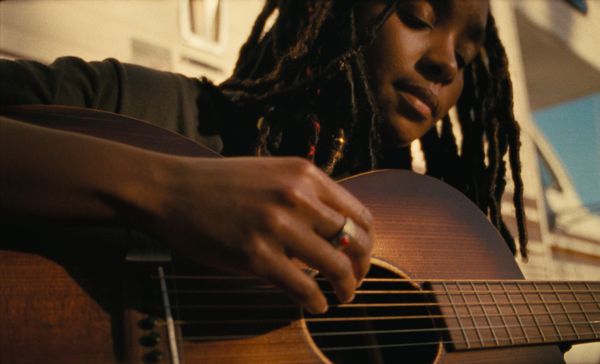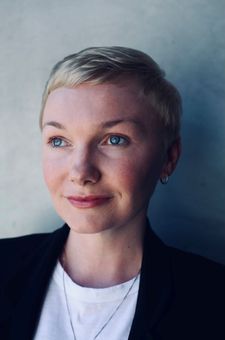 |
| Kiki Layne in Dandelion Photo: courtesy of IFC Films. An IFC Films release. |
Nicole Riegel's sophomore feature, Dandelion, is the second part of a planned thematic trilogy of films about three different women from lower income backgrounds. Following her 2020 feature debut, Holler, about Ruth (Jessica Barden), a teenager with dreams of going to college, who gets a job at a scrapyard, she shifts focus to Dandelion (KiKi Layne), a struggling thirtysomething Cincinnati singer-songwriter.
Ready to sell her guitar and give up on her dream, Dandelion takes one last shot at a gig at a motorcycle rally in South Dakota. She crosses paths with Casey (Thomas Doherty), a guitarist, who introduces her to his nomadic group of struggling musicians. Amid her waning self-belief, she finds a new perspective on her creative journey.
 |
| Nicole Riegel |
In conversation with Eye For Film, Riegel lamented the cinema she once knew, the future of her trilogy, and social media toxicity and its affect on artists.
Paul Risker: In your director's statement you write, "She [Dandelion] plays her guitar like I hold a camera: without permission." Could you elaborate on this captivating comparison between you and the film's titular character?
Nicole Riegel: It has two meanings. I'm a woman in the directing chair and there's not a lot of us that get those opportunities. I've always had to make films without permission, meaning that before anyone gives me any financing to make the film, I go out and fund parts of it myself - my producer Adam [Cobb] does as well. I just start making a film as if the money is going to come in. I don't wait around for someone to write me a big cheque. If I did, I'd probably not have any movies. I just figure it out and find a way to make it work outside the establishment.
Secondly, what I mean by that is, we're living in a time, especially in American film, where we can't offend people. The cinema I grew up with offended you. Art should offend and you should have different opinions. Everyone doesn't have to watch it and feel happy. Some people like it, some people don't. Some people will say that offended me, but what they mean is it made them absorb something that makes them uncomfortable. That's what I mean by offends - I don't mean it as in harming a person, but it should make you feel something and think about things you'd never considered before.
Now, I think we're making cosy cinema that has to make everyone feel good and organised and okay. Director Andrew Dominik, who made The Assassination Of Jesse James By The Coward Robert Ford, talks a lot about how cinema used to mean, to offend. That was the intention and I still want to keep making films that way. There are little political layers in my films, but it's not on the nose, and I have no interest in making films that don't offend people.
PR: Trilogies are traditionally narrative led, but there are those connected by themes and ideas. For example, Ingmar Bergman's Trilogy of Faith (Through A Glass Darkly, Winter Light and The Silence), and Michelangelo Antonioni's Trilogy of Decadence (L'Avventura, La Notte and L'Eclisse). When did you first have an inkling that you wanted to do a thematic trilogy?
NR: I originally set out to make something like Kelly Reichardt's Certain Women, where she's exploring these different women in this one place. It's not exactly like that, but I thought about doing something like that with Ruth, Dandelion, and another character. I could never quite crack it and then Holler came out, then Dandelion.
I wanted to chart the desires and dreams of three different women from lower income backgrounds and how class affects their dreams and desires, but through very different lived experiences. The third one, the concluding one, will most likely not be my next film. I just need some time away and some perspective before I can make that film. But I know I want to deal with a portrait of a woman in her 50s or 60s, and I want to deal with age and time.
PR: It sounds interesting, and I can understand why you want a break, because time and distance will allow you to digest and see the themes differently. Also, the third film will need to be self-reflective and show self-awareness, which time will give you.
NR: Yeah, I need the time and the film needs it too. Ruth is a teenage woman's story, Dandelion is a thirtysomething woman's story, and a fifties or sixties woman's story will need to be reflective. It's funny that you mention Bergman - I love Wild Strawberries and how reflective of one's life that is.
I am going to bring it back to Ruth, and when I make the third film, the plan is for all of us to know what happened to Ruth and Dandelion many years later. And other characters from the films are going to come back.
Each film can stand on its own, but my hope is the three together, back-to-back, will be like, 'Wow, that's a very different experience.' I can see it in my head, but it's very hard to communicate until it's out there in the world, but I feel like you understand it.
PR: I watch Scent Of A Woman, and the regret of Al Pacino's character resonates with me more strongly than it did for my younger self. The same can be said about the father and son relationship in Tim Burton's Big Fish. I wonder whether your trilogy will grow with the audience.
NR: I couldn't agree more, and it reminds me of Nouchka van Brakel, a Dutch filmmaker I love. Nouchka has a trilogy (The Debut, A Woman Like Eve and The Cool Lakes Of Death) about three different women - I think you would love it.
[...] Recently, Criterion made her a discovery for lots of people and brought her a little more into mainstream cinema. By mainstream, I mean they brought her into mainstream independent cinema. But her films are worth checking out. They're beautiful and the first one's my favourite, but it was cool to discover her.
PR: It strikes me that Dandelion is a critique of social media, specifically how it's a space to compare ourselves to others and measure our sense of self-worth.
NR: We all struggle with it and years ago I had to restrict my usage of social media. I use a Facebook account to promote a movie, but once the movie is finished, it is deleted and goes away. I have an Instagram page that is devoted to cinema and telling people about movies that I love and giving updates on my movies. It's just cinephiles following me, and we just have a discussion like you would have on Letterbox. I don't use TikTok or YouTube.
I am largely an analogue person, and I'm very strict with my Instagram because I don't want things to leak in the way it does for Dandelion. I think it really contributes to a lot of artists walking around feeling distracted from their art and feeling awful about themselves because it's a comparison to others. There's a line in the movie when her friend Brandy says, "Instagram doesn't make you good." That's so true.
Agencies and management companies send us an actor's following count and my eyes roll as soon as I see it because I'm casting your client; I'm casting you as an actor or hiring a musician because you're talented. I don't care if you have six million followers, three thousand followers or two followers. I'm casting you because I think you're talented and right for the role.
I have a lot of musician and actor friends who are struggling in those fields and a lot of them are a bit obsessed with their following counts. What's happening for artists is their following count is outweighing their talent.
PR: Another beautifully articulated line in your director's statement reads, "The beauty of art is there is nothing to be won. There is only process."
NR: Dandelion is a film about process versus results. The process you can control. You are in control of your happiness because you're in control of your process. People might hate Dandelion - I don't care. That sucks, and maybe it stings me a bit and makes me feel a little bummed, but I have to not care, or it'll be too crippling for me. I can control the process; I can't control your life experience or your tastes, and what you like or don't like. Let a distributor worry about that. I'm a filmmaker - I make a film, and then I'm onto the next.
As a filmmaker I'm not dying to do press. I want to go out, and I want to talk to people like you that love cinema, but I'm not there to go and talk about my clothes or do a photoshoot. I am here to make films and when I make one, I'm onto the next. I like to curate my world that way, or else I'm not able to write or make films.
Dandelion releases theatrically in the US on Friday 12th July courtesy of IFC Films.





















